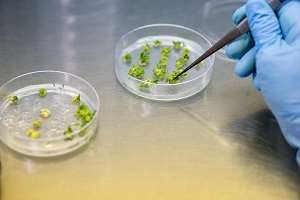
Improved procedure will accelerate research into breeding more productive crops Boyce Thompson Institute
Tomatoes are already an ideal model species for plant research, but scientists at the Boyce Thompson Institute (BTI) just made them even more useful by cutting the time required to modify their genes by six weeks.
While looking for ways to make tomatoes and other crop plants more productive, BTI Assistant Professor Joyce Van Eck and former postdoctoral scientist Sarika Gupta developed a better method for "transforming" a tomato--a process that involves inserting DNA into the tomato genome and growing a new plant. By adding the plant hormone auxin to the medium that supports growth of tomato cells, they can speed up the plant's growth, ultimately accelerating the pace of their research. They describe this advance in a study published in Plant Cell, Tissue and Organ Culture.
Typically, transformation works by using a soil bacterium called Agrobacterium tumefaciens to insert a new segment of DNA into the cells of tomato seedling tissues. The transformed cells are transplanted onto plant regeneration medium, which contains nutrients and hormones that cause the tissue to grow into a tiny new plant. These plantlets are then transferred to root induction medium where they grow roots, before being planted in soil and hardened in the greenhouse. In the new method, the Van Eck lab adds auxin to the regeneration and rooting media. The addition reduces the length of the procedure from 17 weeks to just 11.
Click here to see more...